Lutherans are taking action across the country! Below you will find our monthly State Advocacy Newsletter. Share with your friends!
A Message from the Rev. Stephen P. Bouman, ELCA Executive Director for Domestic Mission
On the 15th anniversary of 9-11 I posted from the first chapter of my new book, Baptized For This Moment. The book traces the world which emerged from Ground Zero, fearful, divided, graceless. I hope and pray that the book is helpful to congregations trying to find their voice and space in this public arena and its many manifestations of terror, racial violence, immigration, disaster, refugees, space for listening and engaging in new ways. I hope and pray that the book will be an invitation to young adults to consider church as an institution supporting their desire to show up and make a difference in our polarized world. Chapter Six deals directly with the Hunger Ministries, Advocacy, and how congregations can enter the public arena. Blessed Advent to all. If you follow this URL you will get the first chapter. If you care to purchase the book use the code: JUSTICE for free shipping and 50% discount.
http://actapublications.com/baptized-for-this-moment/
Any royalties will go to the domestic ministries of The ELCA Hunger Fund. I am grateful to the Advocacy Network for your witness to the Gospel and its vision for justice in our world.
ELCA Advocacy Office, Washington, D.C.
The Rev. Amy Reumann, director
ELCA.org/advocacy
2016 ELECTIONS: Advocacy Director Amy Reumann offered an advocacy message on the 2016 election, highlighting stewardship of our common life together and looking ahead. The statement thanked Lutherans who took action for #ELCAvotes and advocacy intentions moving forward. Her statement can be shared on the ELCA Advocacy Blog.
Lutheran congresswomen Lois Capps, D-Calif, and Cynthia Lummis, R-Wyo., did not run for re-election and are retiring at the end of the year. All other incumbent Lutheran members of the House and Senate facing re-election won their respective seats in November. Joining the 115th Congress are newly elected Lutheran members Rep. Jack Bergman, R-Mich., and Rep. Lloyd Smucker, R-Pa.. The new members of Congress are now in D.C. for orientation and will begin their first session in January. ELCA Advocacy will hold meetings with newly elected officials at the start of the new Congress.
ADVOCACY ADVENT DEVOTIONS: Throughout Advent, ELCA Advocacy is releasing video devotions to connect our work with the life of the church. The videos are on the ELCA Advocacy Facebook page.
HOUSING AND HOMELESSNESS: Congress is preparing to pass a final spending bill to fund the government in December, and support for housing and homeless programs are at risk for cuts. A congressional proposal for moving a “continuing resolution,” or a stalling plan that keeps federal funding flat for several months, would risk cutting many existing Housing and Urban Development (HUD) and affordable-housing contracts that keep families secure in stable homes. Inflation and rising housing costs across the U.S. are putting constraints on housing and homeless programs. HUD needs approximately a $1 billion increase just to keep existing programs and units open. ELCA Advocacy sent an action alert to support sustainable housing funding earlier this month.
For about 75 percent of extremely low-income renters, more than half of their monthly income must be spent on rent. This leaves very little money for food, healthcare, child care, transportation, and other vital day-to-day costs. Affordable housing and HUD programs can make the difference between fearing eviction and striving for greater economic mobility.
WATER JUSTICE IN FLINT: Republican leaders in Congress seem intent on passing financial support for Flint, Mich., and other cities facing lead crises by the end of the year. Aid to help repair lead pipes and water infrastructure, which was included in the Water Resources Development Act (WRDA), has stalled in Congress due to an unrelated debate on the bill for Army Corps of Engineers projects. If the WRDA is not passed by the end of December, Republican and Democratic leaders are discussing ways to tack the support onto the final government spending bill. Advocates can take action on this issue by visiting ELCA.org/advocacy.
UNITED NATIONS CLIMATE CHANGE CONFERENCE: Ruth Ivory-Moore, policy director for environment and energy issues, returned from Marrakech, Morocco, this month following the U.N. Climate Change Conference meeting. International delegates began the process of implementing the Paris Agreement. Ruth’s reflection series and commentary on faith-based involvement is on the ELCA Advocacy Blog. Negotiators worked on issues such as common timeframes for national climate pledges and goals for financing climate projects. By the conclusion, there was an overwhelming sense of resolve that addressing climate change globally will occur and that the process will not be deterred by any individual country or head of state. The next conference will be in Bonn, Germany.
Lutheran Office for World Community, United Nations, New York, N.Y.
Dennis Frado, director
U.N. INTERNATIONAL DAY FOR THE ELIMINATION OF VIOLENCE AGAINST WOMEN: On Nov. 21, an “Orange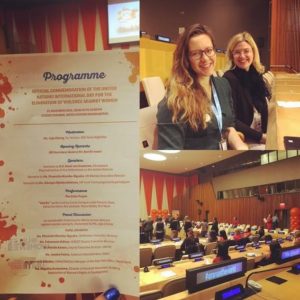 the World” event took place to mark the beginning of the 16 days of activism against Gender-Based Violence Campaign, Nov. 25-Dec. 10. Panelists included representatives from U.N. Women, UNICEF, the U.N. Population Fund, the U.N. Development Programme, the World Bank and civil society organizations. Everyone involved emphasized the importance of action, as 1 in 3 women globally continues to suffer from domestic violence.
the World” event took place to mark the beginning of the 16 days of activism against Gender-Based Violence Campaign, Nov. 25-Dec. 10. Panelists included representatives from U.N. Women, UNICEF, the U.N. Population Fund, the U.N. Development Programme, the World Bank and civil society organizations. Everyone involved emphasized the importance of action, as 1 in 3 women globally continues to suffer from domestic violence.
The panelists elaborated on many aspects of gender-based violence. Many emphasized a funding shortfall and the need for sustainable financing: Even though the overall aid flows have increased, only about 8 percent of aid goes to gender-focused programs in affected countries and even less to women-led organizations.
ADDRESSING MIGRATION AROUND THE WORLD: On Nov. 22, Global Compact Modalities co-facilitators Mexico and Switzerland convened a meeting for members of civil society to discuss involvement in the 2017 global compact negotiations. More than 20 non-government organizations (NGO) representatives took the floor to discuss civil society involvement, including many of our ecumenical partners and a representative of the NGO Committee on Migration. Most speakers emphasized the importance of active civil society participation through regional and global consultations during every stage of the process, and increased transparency throughout the negotiations. A focus was placed on the inclusion of different migrant voices and vision, and the inclusion of differing intersectional identities – such as migrants with disabilities, and migrant children.
California
Mark Carlson, Lutheran Office of Public Policy
loppca.org
A NEW LEGISLATURE: The Capitol Christmas tree was lit and the California Legislature reconvened on Dec. 5. Democrats 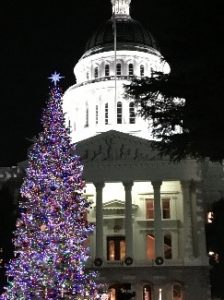 achieved a two-thirds majority in each house in the November election. Although the debate was contentious, a resolution passed supporting immigrants to help counter the widespread fear and anxiety across the state, and legislation was introduced to train public defenders in immigration law and fund private attorneys to aid undocumented immigrants who are otherwise law-abiding and may face deportation.
achieved a two-thirds majority in each house in the November election. Although the debate was contentious, a resolution passed supporting immigrants to help counter the widespread fear and anxiety across the state, and legislation was introduced to train public defenders in immigration law and fund private attorneys to aid undocumented immigrants who are otherwise law-abiding and may face deportation.
THE ELECTION was generally positive for LOPP-CA ballot measure recommendations, including extension of the top personal-income tax rate on the wealthy, a ban on single-use plastic shopping bags, a school-bond measure and a higher tobacco tax. Disappointing exceptions were the defeat of an initiative to end the death penalty and narrow passage of one to speed up its implementation.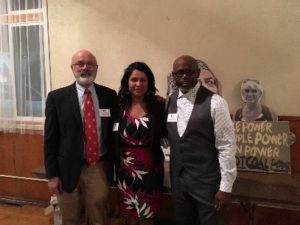
CALIFORNIA INTERFAITH POWER & LIGHT COOL CLIMATE AWARDS IN OAKLAND: One of the highlights of November was the always-inspiring California Interfaith Power & Light Cool Climate Awards in Oakland, which recognize congregations and individuals making a difference in addressing climate change. Mark serves on the group’s steering committee, as do G.L. Hodge, a pastor in the Bayview-Hunters Point area of San Francisco, and Juana Torres, who works for the Sierra Club in Los Angeles and is an alum of California Lutheran University (photo).
Colorado
Peter Severson, Lutheran Advocacy Ministry – Colorado
lam-co.org
STATE ELECTIONS RECAP: Colorado’s Legislature remained under split control after the Nov. 9 elections. Republicans control the state Senate, 18-17, while Democrats increased their edge by three seats in the state House, 37-28. U.S. Sen. Michael Bennet was re-elected, as were all seven incumbent members of the House.
Lutheran Advocacy Ministry-Colorado actively supported two ballot measures: Amendment 70 and Amendment T. Amendment 70, to increase the state minimum wage to $12/hour by 2020, passed by a wide margin, 55 percent to 45 percent. Unfortunately, Amendment T, a referred measure to eliminate an archaic exception to the ban on slavery, lost very narrowly, 50.2 percent to 49.7 percent. Supporters believe that many voters were confused by the language of Amendment T, and the original sponsor has vowed to try again with clearer language. Thank you to all the advocates who supported both amendments with us!
In addition to these measures, Colorado voters defeated proposals to establish a statewide health insurance system and an increase in tobacco taxes. Voters approved a measure that will make it harder to amend the state’s constitution in the future, as well as proposals to permit physician-assisted death for terminally ill people, to replace the caucus with a presidential primary, and to allow independent voters to vote in party primaries.
The LAM-CO Policy Committee met on Nov. 15 to approve the 2017 legislative agenda. We will be addressing poverty, hunger, inequality, homelessness and harm to the environment, promoting the God-given dignity and value of every human being. Join us!
Minnesota
Tammy Walhof, Lutheran Advocacy – Minnesota
tammy@lcppm.org
2017 MINNESOTA HOUSE OF REPRESENTATIVES: Republicans retained control of the House, and 23 new representatives join the body (12 R; 11 DFL). When combined with significant turnovers in the previous two elections, the number of relatively new members is quite high (2012: 42 new – 27 DFL, 15 R; 2014: 26 new – 21 R, 5 DFL).
2017 MINNESOTA SENATE: The Senate unexpectedly changed hands. Notably, eight long-term, powerful incumbents (6 DFL, 2 R) were voted out of power. Along with 12 retirements (8 DFL, 4 R) and one death (DFL), levels of issue knowledge and experience change significantly. There are 21 new senators (12 R, 9 DFL), including some previous representatives.
IMPLICATIONS FOR ISSUES:
- Housing: Affordable housing and related services saw significant bipartisan support over several years. House leadership in 2016 did not show the same bipartisan support, despite member backing. Relatively new members and leaders may need to be introduced to Minnesota’s housing crisis.
- Clean energy: Legislation for renewable energy passed in 2007 with strong bipartisan support, resulting in Minnesota becoming a leader in wind, solar and energy efficiency. However, with turnovers, a majority of representatives and at least one-third of senators lack background on previous efforts and progress. Many from both parties still carry decades-old perceptions about technology, leading to attacks on standards that have already been reached or will be soon. Legislator education is needed!
- Migration: Given campaign rhetoric, substantial work is anticipated with and for people of color and Muslims, including refugees and immigrants.
New Mexico
Ruth Hoffman, Lutheran Advocacy Ministry – New Mexico
lutheranadvocacynm.org
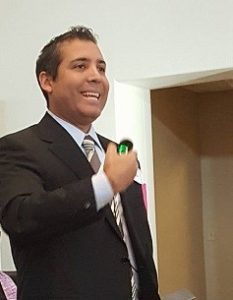 More than 80 advocates gathered on Nov. 5 for the annual LAM-NM Advocacy Conference in Albuquerque. This year’s conference was held at the parish of one of our advocacy partners, St. Michael & All Angels Episcopal Church. The keynote speaker was Dr. Nicholas Natividad from New Mexico State University who spoke about racism and the history of criminal justice on the border (See picture, left). Other breakout sessions covered the need for state revenue and no further cuts to the New Mexico budget, the need for the creation of the mid-level profession of dental therapist to help meet the dental needs of low-income New Mexicans, the situation regarding immigration in our state, and advocacy basics. Rep. Gail Chasey from Albuquerque was the lunch speaker.
More than 80 advocates gathered on Nov. 5 for the annual LAM-NM Advocacy Conference in Albuquerque. This year’s conference was held at the parish of one of our advocacy partners, St. Michael & All Angels Episcopal Church. The keynote speaker was Dr. Nicholas Natividad from New Mexico State University who spoke about racism and the history of criminal justice on the border (See picture, left). Other breakout sessions covered the need for state revenue and no further cuts to the New Mexico budget, the need for the creation of the mid-level profession of dental therapist to help meet the dental needs of low-income New Mexicans, the situation regarding immigration in our state, and advocacy basics. Rep. Gail Chasey from Albuquerque was the lunch speaker.
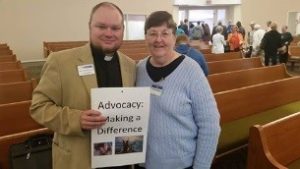 Director Ruth Hoffman traveled to El Paso, Texas, to present sessions about advocacy along with the
Director Ruth Hoffman traveled to El Paso, Texas, to present sessions about advocacy along with the Rev. Sam Brannon, our State Public Policy Office with Texas Impact at the Rocky Mountain Synod Border Conference Missional Gathering (See picture, left). The Border Conference includes congregations in southern New Mexico and in El Paso, Texas. Ruth also returned to the border area last week to present at a forum at Peace Lutheran Church in Las Cruces. She spoke about the upcoming legislative session and the LAM-NM Advocacy Agenda (See picture, right).
Rev. Sam Brannon, our State Public Policy Office with Texas Impact at the Rocky Mountain Synod Border Conference Missional Gathering (See picture, left). The Border Conference includes congregations in southern New Mexico and in El Paso, Texas. Ruth also returned to the border area last week to present at a forum at Peace Lutheran Church in Las Cruces. She spoke about the upcoming legislative session and the LAM-NM Advocacy Agenda (See picture, right).
Ohio
Nick Bates, Hunger Network in Ohio
www.hungernetohio.org
LAME DUCK LOBBY DAY: Ohio faith leaders talked turkey and got to the “meat of the issue” this holiday season. Too many Ohioans are struggling to find food for their table, and unemployment compensation and other public investments are a moral covenant to help hard-working Ohio families survive today so that they can thrive tomorrow.
On Nov. 17, about 24 faith leaders came to Columbus for our Let’s Talk Turkey Advocacy Day. We grounded our morning in our faith with a brief litany and a chance to reflect on the call in Isaiah.
After centering ourselves on God’s call for justice in the world, it was time for us to get to work! Small teams were formed to 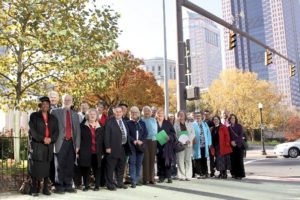 study the issues of Ohio’s unemployment compensation system and Ohio’s upcoming state budget. Both of these policy issues can help families who are struggling have the resources they need to put food on the table and a stable roof over their head.
study the issues of Ohio’s unemployment compensation system and Ohio’s upcoming state budget. Both of these policy issues can help families who are struggling have the resources they need to put food on the table and a stable roof over their head.
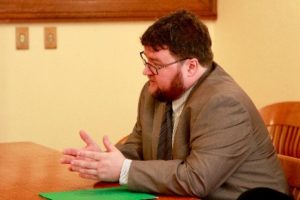 Before we knew it, teams were leaving to cross the street to enter the Ohio Statehouse to meet with 19 legislative offices. Teams crisscrossed the Statehouse for four hours meeting with these legislators and their staffs. Faith leaders shared their personal stories, experiences and passion for justice with those who hold seats of power – calling on them to use their temporal authority to show mercy, justice and love for those who are hungry.
Before we knew it, teams were leaving to cross the street to enter the Ohio Statehouse to meet with 19 legislative offices. Teams crisscrossed the Statehouse for four hours meeting with these legislators and their staffs. Faith leaders shared their personal stories, experiences and passion for justice with those who hold seats of power – calling on them to use their temporal authority to show mercy, justice and love for those who are hungry.
We are blessed to have so many faith leaders, because Ohio legislators are expected to introduce a new unemployment compensation bill next week. Hopefully the image of pastors, laity and handmade turkey art from the children of Emanuel Lutheran Church in Napoleon, Ohio, will stick with them this holiday season as they finish their work. Check out our blog and photos from the day!
Pennsylvania
Tracey DePasquale, Lutheran Advocacy – Pennsylvania
lutheranadvocacypa.org
LAMPa Policy Council hosted its annual meeting with Pennsylvania bishops on Dec. 1 to adopt a biennial issue agenda and discuss how we can be public church in a post-election climate that shows Lutherans as politically divided as the rest of the country. LAMPa and Pennsylvania ELCA partners will work together to find ways to train leaders on guiding tough discussions based upon our common faith. We continue to move toward launching issue teams to engage the passion, expertise and lived experience of more Lutheran advocates. We believe this will increase our capacity, confidence and agility to act with urgency.
LAMPa is encouraging host sites in every synod for Trinity Institute 2017, March 22-24, on the theme of water justice and will provide advocacy opportunities for those events. Also related to water issues, LAMPa Director Tracey DePasquale has been invited to meet with natural resources, environmental protection and agriculture officials to shape policies around buffer zones that address economic sustainability and hunger.
Also in November, Tracey participated in the Lutheran, Anglican, Roman Catholic Day of Dialogue in Harrisburg. The theme was “Rooted in Common Ground: Our Universal Call to Care for Creation.” It was a great opportunity to make connections with faith partners on climate change work in Pennsylvania. She also attended Pennsylvania Power & Light’s annual conference in State College that linked climate justice and social justice, the Housing Alliance’s Homes Within Reach Conference. She has also been equipping congregations seeking information on offering sanctuary to immigrants facing possible deportation.
Southeastern Synod
Hilton Austin, Director
haustin337@att.net
SOUTHEASTERN SYNOD ADVOCACY TEAM: November was a busy month of meeting with our advocacy partners to 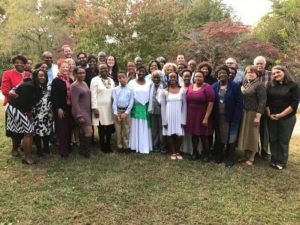 determine our priorities for the 2017 legislative session, and that work continues this month. Until the transition of power takes place, it seems continued criminal justice reform is the only defined priority. We also had the opportunity to setup our advocacy exhibit at the Conference 3 gathering and to begin to form relationships with leaders from several congregations, as well as having some great conversation around advocacy.
determine our priorities for the 2017 legislative session, and that work continues this month. Until the transition of power takes place, it seems continued criminal justice reform is the only defined priority. We also had the opportunity to setup our advocacy exhibit at the Conference 3 gathering and to begin to form relationships with leaders from several congregations, as well as having some great conversation around advocacy.
HUMAN TRAFFICKING: Georgia voters passed a constitutional amendment to create a dedicated source of funding that will provide restorative services like safe housing, trauma  counseling and medical treatment to child victims of sex trafficking without raising or creating any new taxes.
counseling and medical treatment to child victims of sex trafficking without raising or creating any new taxes.
We are currently working on a two-session educational piece on advocacy to present to congregations. The first presentations will be Jan. 8 and Jan. 15; the Jan. 15 session will coordinate with the Martin Luther King Jr. celebration service. We will also be present for Martin Luther King Jr. Service Day on Jan. 16 and hope to coordinate with Lutheran Immigration and Refugee Service in an educational piece on refugee resettlement advocacy.
Texas
Samuel D. Brannon, Texas Impact
texasimpact.org
Climate advocates from Texas Impact and Texas Interfaith Power & Light participated in the 22nd annual United Nations global climate negotiations, known as COP22, in Marrakech, Morocco, last month. Leaders from more than 195 countries attended the Nov. 7-18 talks, which built upon progress made at 2015’s talks in Paris. Now that the Paris Agreement has been finalized, COP22, which has been named the “COP of Action,” focused on implementation.
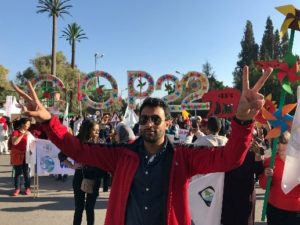 This year, staff participated as credentialed observers of the negotiations: Texas Impact’s executive director, Bee Moorhead, and her daughter, Oona, were credentialed through the Presbyterian Church (USA); Imaad Kahn was credentialed through U.S. Climate Action Network and partnered on this initiative with Green Muslims; and Yaira Robinson attended under the auspices of COEJL (Coalition on the Environment and Jewish Life).
This year, staff participated as credentialed observers of the negotiations: Texas Impact’s executive director, Bee Moorhead, and her daughter, Oona, were credentialed through the Presbyterian Church (USA); Imaad Kahn was credentialed through U.S. Climate Action Network and partnered on this initiative with Green Muslims; and Yaira Robinson attended under the auspices of COEJL (Coalition on the Environment and Jewish Life).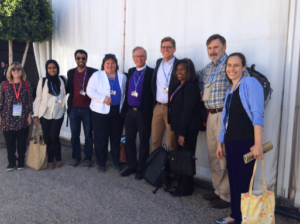
Texas Impact staff had the pleasure of attending the event with Ruth Ivory-Moore, ELCA program director for environment and energy. They also connected with activists, scientists and religious leaders from around the world – bringing real-world climate justice stories home to Texas faith communities through videos, photos and blog posts in a special series called “Bridge to a Bright Climate Future.”
Virginia
Kim Bobo, Virginia Interfaith Center for Public Policy
virginiainterfaithcenter.org
About 400 people attended a “Standing Together” rally Sunday, Dec. 4, at the Third Street Bethel A.M.E. Church in Richmond to stand with those who have increasingly been targeted and marginalized and to demonstrate concern about the recent rise in hate speech, bias and division. The Virginia Interfaith Center for Public Policy was one of the organizers of this event, along with the Interfaith Council of Greater Richmond, the Jewish Community Federation of Richmond, Richmond Hill, Richmond Peace Education Center, St. Paul’s Episcopal Church, St. Phillip’s Episcopal Church, Temple Beth-El, Unitarian Universalist Community Church, the Virginia Center for Inclusive Communities, Bon Secours Health Systems, the Virginia Council of Churches and the Virginia Muslim Coalition for Public Affairs.
This is a busy time for the Virginia Interfaith Center for Public Policy. Our annual meeting is Dec. 15, and the annual Day for All People advocacy event will be Jan. 25 at the state Capitol, the General Assembly and Centenary United Methodist Church in Richmond. On Jan. 8, there will be a forum on wage theft in northern Virginia. The Center is working with at least two congregations in Richmond on plans to establish a Worker Center; there will be a planning meeting on Dec. 13 hosted by the Sacred Heart Center on that issue. VICPP’s Richmond chapter is working the city’s Office of Community Wealth Building to create a living wage certification program aimed at honoring, recognizing and promoting businesses that pay living wages.
Washington
Paul Benz, Faith Action Network
fanwa.org
ANNUAL DINNER: Faith Action Network (FAN) had its sixth Annual Dinner on Nov. 20 with just a little more than 400 in attendance coming from approximately 75 faith communities as well as labor and community allies from around the Puget Sound (Picture left: FAN’s 2016 Annual Dinner). 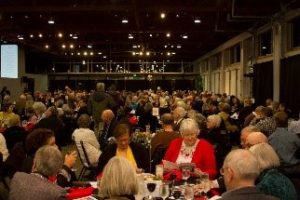 FAN gave out four awards to: the Rev. Dan Erlander,
FAN gave out four awards to: the Rev. Dan Erlander, 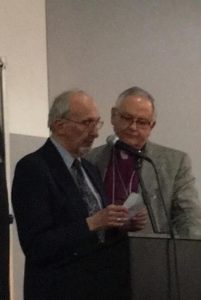 ELCA retired clergy; Bishop Larry Robertson from Emanuel Apostolic Church in Bremerton, Wash.; the Islamic Center of Mukilteo and allies, including congressman Rick Larsen (an ELCA member and Pacific Lutheran University graduate); and two FAN advocates for their amazing work representing FAN on successfully passing the minimum wage ballot initiative. (Picture right: Bishop Kirby Unti presents our award to the Rev. Dan Erlander.)
ELCA retired clergy; Bishop Larry Robertson from Emanuel Apostolic Church in Bremerton, Wash.; the Islamic Center of Mukilteo and allies, including congressman Rick Larsen (an ELCA member and Pacific Lutheran University graduate); and two FAN advocates for their amazing work representing FAN on successfully passing the minimum wage ballot initiative. (Picture right: Bishop Kirby Unti presents our award to the Rev. Dan Erlander.)
2017 LEGISLATIVE SESSION PREP: The 2017 state Legislature will convene on Jan. 9 for its 105-day session, which will likely last much longer. FAN’s Governing Board adopted our 2017 Legislative Agenda, which can be viewed at . FAN is still working on some final interim meetings with elected officials this month and will host two pre-session gatherings for conversation regarding revenue, the basics of advocating with elected officials, and the FAN Legislative Agenda.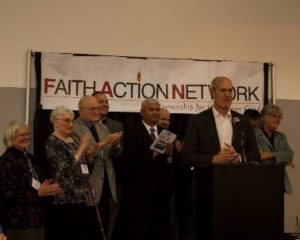
ALLIES FOR NATIVE AMERICANS: In light of the 30th anniversary of a 1987 apology statement to area American Indian tribes, FAN has been convening an Interfaith Allies group with the goal of building better relationships between tribes in our state and faith communities close to that particular tribe. This group has also been very active in networking with many religious leader trips to Standing Rock in North Dakota and doing advocacy here locally with elected officials, especially U.S. senators.
Wisconsin
Cindy Crane, Lutheran Office for Public Policy in Wisconsin
loppw.org
ADDRESSING HATE: LOPPW’s director is part of an interfaith coalition strategizing ways to address the harassment and bullying that have escalated since the election. LOPPW is also inviting people from around the state to help LOPPW collect both stories about harassment and positive stories about how schools and communities are addressing hate.
ECONOMIC JUSTICE: The director led for the second time a workshop on LOPPW’s new presentation on economic justice at Luther Memorial in Madison. The next week LOPPW had a second presentation on Care for God’s Creation at the same congregation.
LOPPW is part of a statewide Dignity at Work Coalition made up of secular and interfaith partners. We met recently in Milwaukee to discuss where we might find traction in the current political climate and campaigns to move forward with.
CARE FOR GOD’S CREATION: Meteorologist Bob Lindmeier drew more than 60 members of Luther Memorial in Madison to learn about climate change and actions to take.
HUMAN TRAFFICKING: LOPPW’s director met for the first time with an ELCA task force to create worship materials to address human trafficking.
LOPPW’s director and Advisory Council member the Rev. Barb Girod were interviewed about the problem of sex trafficking for an hour cable television show, “Eye on Oshkosh.”



 now among us? Do we marvel at how Christ’s birth transforms us to be like that bright star, guiding the nations to God’s light and love revealed in Jesus?
now among us? Do we marvel at how Christ’s birth transforms us to be like that bright star, guiding the nations to God’s light and love revealed in Jesus?
















